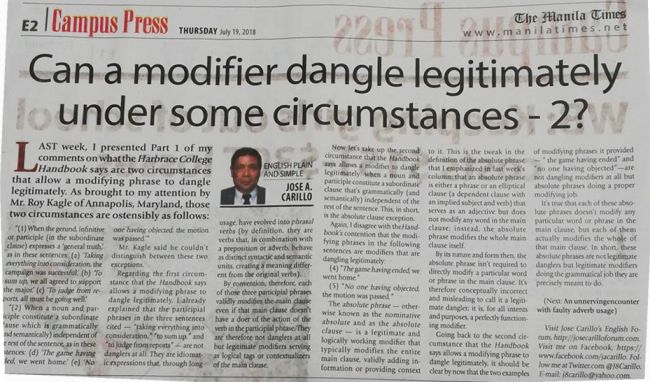Last week, I presented Part 1 of my comments on what the
Harbrace College Handbook says are two circumstances that allow a modifying phrase to dangle legitimately (
“Can a modifier dangle legitimately under some circumstances? - 1”). As brought to my attention by Mr. Roy Kagle of Annapolis, Maryland, those two circumstances are ostensibly as follows:
“(1) When the gerund, infinitive or participle (in the subordinate clause) expresses a ‘general truth,’ as in these sentences: (a) ‘
Taking everything into consideration, the campaign was successful.’ (b) ‘
To sum up, we all agreed to support the major.’ (c) ‘
To judge from reports, all must be going well.’
“(2) When a noun and participle constitute a subordinate clause which is grammatically (and semantically) independent of the rest of the sentence, as in these sentences: (d) ‘
The game having ended, we went home.’ (e) ‘
No one having objected, the motion was passed.’”
Mr. Kagle said he couldn’t distinguish between these two exceptions.
IMAGE CREDIT: REDIFF.COMDID YOU THINK THAT THAT WOMAN IS A REAL, LEGITIMATE DANGLER?*
Regarding the first circumstance that the
Handbook says allows a modifying phrase to dangle legitimately, I already explained that the participial phrases in the three sentences cited—“taking everything into consideration,” “to sum up,” and “to judge from reports”—are not danglers at all. They are idiomatic expressions that, through long usage, have evolved into phrasal verbs (by definition, they are verbs that, in combination with a preposition or adverb, behave as distinct syntactic and semantic units, creating a meaning different from the original verbs).
By convention, therefore, each of those three participial phrases validly modifies the main clause even if that main clause doesn’t have a doer of the action of the verb in the participial phrase. They are therefore not danglers at all but legitimate modifiers serving as logical tags or contextualizers of the main clause.
Now let’s take up the second circumstance that the
Handbook says allows a modifier to dangle legitimately: when a noun and participle constitute a subordinate clause that’s grammatically (and semantically) independent of the rest of the sentence. This, in short, is the absolute clause exception.
Again, I disagree with the
Handbook’s contention that the modifying phrases in the following sentences are modifiers that are dangling legitimately:
(4) “
The game having ended, we went home.”
(5) “
No one having objected, the motion was passed.”
The
absolute phrase— otherwise known as the
nominative absolute and as the
absolute clause—is a legitimate and logically working modifier that typically modifies the entire main clause, validly adding information or providing context to it. This is the tweak in the definition of the absolute phrase that I emphasized in last week’s column: that an absolute phrase is either a phrase or an elliptical clause (a dependent clause with an implied subject and verb) that serves as an adjective but does not modify any word in the main clause; instead, the absolute phrase modifies the whole main clause itself.
By its nature and form then, the absolute phrase isn’t required to directly modify a particular word or phrase in the main clause. It’s therefore conceptually incorrect and misleading to call it a legitimate dangler; it is, for all intents and purposes, a perfectly functioning modifier.
Going back to the second circumstance that the
Handbook says allows a modifying phrase to dangle legitimately, it should be clear by now that the two examples of modifying phrases it provided—“ the game having ended” and “no one having objected”—are not dangling modifiers at all but absolute phrases doing a proper modifying job.
It’s true that each of these absolute phrases doesn’t modify any particular word or phrase in the main clause, but each of them actually modifies the whole of that main clause. In short, these absolute phrases are not legitimate danglers but legitimate modifiers doing the grammatical job they are precisely meant to do.
 This essay, 1101st of the series, appeared in the column “English Plain and Simple” by Jose A. Carillo in the Campus Press section of the July 19, 2018 issue (print edition only) of
This essay, 1101st of the series, appeared in the column “English Plain and Simple” by Jose A. Carillo in the Campus Press section of the July 19, 2018 issue (print edition only) of The Manila Times
, © 2018 by the Manila Times Publishing Corp. All rights reserved.----------
*Check what the real score is about that dangling woman by clicking this link to "Daredevil dangling his fiance over cliff isn't quite what it seems."(Next:
An unnerving encounter with faulty adverb usage) July 26, 2018